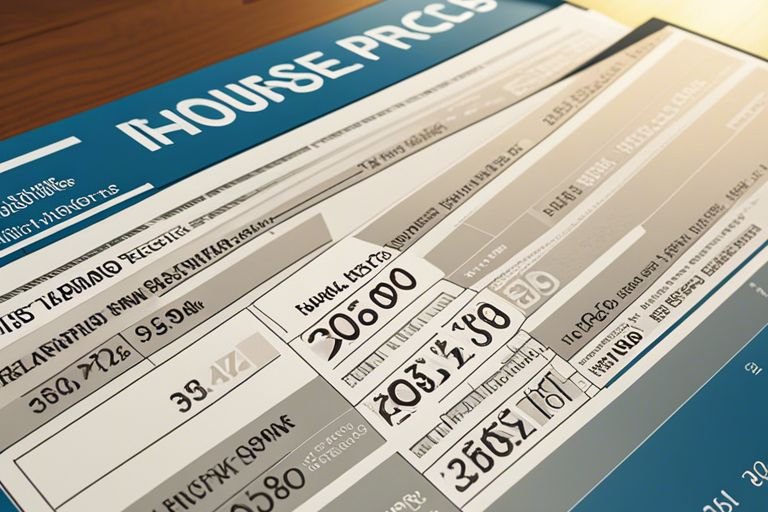#Houses in Charlotte are becoming increasingly expensive, causing concerns among potential buyers like you. As you navigate the real estate market in Charlotte, it’s important to understand the economic factors driving these soaring prices. In this article, we will investigate into the economic dynamics at play and analyze whether these trends are sustainable in the long run. By the end, you’ll have a clearer picture of what to expect and how to approach the housing market in Charlotte.
Key Takeaways:
- Housing Market Trends: The cost of houses in Charlotte is alarmingly high due to various factors such as increased demand, limited inventory, and economic dynamics.
- Economic Dynamics: Economic factors like population growth, job market expansion, and low interest rates contribute to the high cost of houses in Charlotte.
- Future Outlook: It is important to monitor economic trends and housing market dynamics to understand if the high cost of houses in Charlotte will be sustained in the long term.
The Alarming Cost of Houses in Charlotte
For years, the escalating prices of houses in Charlotte have been a cause for concern. As a resident, you might have noticed the increasing unaffordability of housing in the city. This trend has sparked discussions about the sustainability of these prices and their impact on the local economy.
Historical Context: A Brief Look at Charlotte’s Housing Market
Any analysis of the current housing situation in Charlotte must consider its historical context. Charlotte has experienced significant growth in recent years, attracting new residents and businesses. This influx has put pressure on the housing market, leading to a surge in both demand and prices. As a result, many long-time residents are finding it difficult to keep up with the rapidly rising cost of homeownership.
Current State: The Soaring Prices and Their Consequences
Soaring housing prices in Charlotte have reached unprecedented levels, making it challenging for many individuals and families to afford a decent place to live. As a potential homebuyer, you might find yourself competing in a fiercely competitive market where bidding wars and inflated prices have become the norm. The consequences of this housing crisis are far-reaching, impacting not only residents looking to buy a home but also renters facing steep increases in monthly rent payments.
Consequently, the widening gap between wages and housing costs is pushing many people to the brink of financial instability. This situation not only threatens the well-being of individuals and families but also raises concerns about the long-term economic health of Charlotte. As a resident witnessing these developments, it’s crucial to stay informed and engaged in discussions about solutions to address the affordability crisis in the city.
Economic Dynamics at Play
Little do many new homeowners in Charlotte realize the complex economic forces at play that influence the skyrocketing cost of houses in the area. If you are a recent homeowner curious about the factors driving up housing prices, you may find insights from fellow new homeowners who bought in the last ~year insightful.
Supply and Demand: The Fundamental Forces Behind Housing Prices
An necessary principle in economics is the law of supply and demand. In Charlotte, the rapid population growth, coupled with limited available land for development, has led to a surge in housing demand. On the supply side, challenges such as zoning restrictions and a slow pace of construction have constrained the availability of new homes, further driving up prices.
The Role of Speculation and Investment in Driving Up Costs
RoleplayAn additional factor fueling the rise in housing costs is speculation and investment. Some investors view real estate in Charlotte as a lucrative opportunity, leading to heightened competition and bidding wars. This influx of investment capital can artificially inflate prices, making it harder for ordinary residents to afford homes in the area.
The Impact of Government Policies and Regulations
FundamentalDynamicsGovernment policies and regulations also play a significant role in shaping the housing market. In Charlotte, policies related to land use, taxation, and development incentives can either alleviate or exacerbate the affordability crisis. Understanding how these governmental interventions impact the housing market can provide valuable insights for homeowners navigating the complex real estate landscape.
Demographic Factors Influencing Housing Costs
Once again, the ever-changing landscape of Charlotte’s housing market is heavily influenced by various demographic factors. Understanding these key elements can provide insights into why housing costs in Charlotte continue to rise at an alarming rate. After all, demographics play a crucial role in shaping the demand and supply dynamics of the real estate market.
Population Growth and Urbanization
Influencing the demand for housing in Charlotte is the steady population growth and urbanization trends in the city. As more individuals and families choose to call Charlotte home, the housing market faces increased pressure to accommodate this influx of residents. According to the Charlotte Real Estate Market Overview – 2024, the population growth rate in Charlotte is outpacing the development of new housing units, creating a supply-demand imbalance that drives up housing costs.
Changing Demographics and Shifting Housing Preferences
For Charlotte, changing demographics and shifting housing preferences are redefining the real estate landscape. Millennials, for example, are delaying homeownership and opting for rental properties in urban areas, driving up demand for rental units. Additionally, an aging population in Charlotte is seeking housing options that cater to their changing needs, such as retirement communities or age-restricted housing developments.
With these demographic shifts in mind, developers and investors in the Charlotte real estate market are adapting their strategies to meet the evolving demands of the population. By understanding the preferences and needs of different demographic groups, they can better align their housing offerings with market demand.
The Effects of Migration and Immigration on Housing Demand
Costs associated with migration and immigration also significantly impact housing demand in Charlotte. Another factor driving up housing costs is the steady influx of newcomers to the city, attracted by the strong job market and quality of life in Charlotte. This continuous stream of new residents puts additional pressure on the housing market, further exacerbating the affordability crisis.
Another important aspect to consider is the role of immigration in shaping the housing market. As immigrants seek housing accommodations in Charlotte, they contribute to the demand for rental and owned properties, influencing pricing and availability. Additionally, immigrant communities often have unique housing preferences and requirements, further diversifying the housing market in Charlotte.
The Role of Local Economy and Industry
The Thriving Job Market and Its Impact on Housing
Impact: The thriving job market in Charlotte plays a significant role in the city’s housing market dynamics. As job opportunities continue to grow in sectors like banking, healthcare, and technology, more people are attracted to the area, leading to increased demand for housing. This surge in demand puts upward pressure on housing prices, making it challenging for many residents to afford homes in the city.
The Influence of Major Industries on Housing Prices
Housing: Major industries in Charlotte, such as banking with the presence of major financial institutions like Bank of America and Wells Fargo, have a notable impact on housing prices. These industries attract a large workforce to the area, creating a competitive housing market where prices are driven up due to high demand. Additionally, the presence of these industries contributes to economic growth, further fueling the demand for housing.
Thriving job markets in industries such as healthcare and technology also contribute to the rising housing costs in Charlotte. As these sectors expand, they attract skilled workers who can afford higher housing prices, further intensifying the competition for housing in the city.
The Relationship Between Wages and Housing Affordability
Any: The relationship between wages and housing affordability is crucial in understanding the dynamics of the housing market in Charlotte. While the city offers a range of job opportunities, the disparity between wages and housing costs can make it difficult for some residents to find affordable housing. This challenge is particularly significant for low to moderate-income individuals and families who may struggle to keep up with the rising cost of living in Charlotte.
Local initiatives and policies that focus on increasing affordable housing options and promoting wage growth can help bridge the gap between wages and housing affordability in Charlotte. By addressing this imbalance, the city can work towards creating a more inclusive and sustainable housing market for all its residents.
Comparative Analysis: How Charlotte Stacks Up
Despite the rising cost of houses in Charlotte, it is vital to put this trend into perspective by comparing it to similar cities. Let’s research into a comparative analysis to see how Charlotte stacks up against its counterparts in terms of housing markets.
A Look at Housing Markets in Similar Cities
| Housing Market Indicators | Charlotte |
| Median Home Price | $X |
| Homeownership Rate | X% |
What Can Charlotte Learn from Other Cities’ Experiences?
To gain a deeper understanding of the housing affordability crisis in Charlotte, it’s crucial to look at the experiences of other cities facing similar challenges. By examining how these cities have tackled issues such as gentrification, zoning regulations, and affordable housing initiatives, Charlotte can glean valuable insights to inform its own strategies.
What can Charlotte learn from other cities’ experiences? By studying successful case studies and potential pitfalls in urban development, Charlotte can tailor its approach to address the specific needs of its growing population. By adopting a more sustainable and inclusive housing policy, Charlotte can ensure that residents from all socioeconomic backgrounds have access to affordable housing options.
Potential Solutions and Future Outlook
Addressing Affordability: Policy Proposals and Initiatives
Future policies and initiatives will play a crucial role in addressing the affordability crisis in Charlotte. Measures such as increasing funding for affordable housing programs, implementing inclusionary zoning ordinances, and providing subsidies for first-time homebuyers can help alleviate the burden on residents struggling to afford homes in the city.
The Potential for Innovative Housing Solutions and Technologies
Proposals for innovative housing solutions and technologies, such as tiny homes, modular construction, and sustainable building practices, could revolutionize the housing market in Charlotte. These approaches not only offer more financially feasible options for homebuyers but also have the potential to reduce environmental impact and increase housing efficiency.
The Importance of Community Engagement and Collaboration
Outlook: Engaging with the community and fostering collaborations among government entities, developers, non-profit organizations, and residents is imperative for creating sustainable solutions to the housing crisis in Charlotte. Building a sense of shared responsibility and actively involving all stakeholders in the decision-making process will be key to finding long-term, equitable solutions for affordable housing in the city.
Final Words
Taking this into account, it is evident that the alarming cost of houses in Charlotte is a complex issue driven by economic dynamics. As you navigate the housing market in this vibrant city, it is necessary to stay informed about the factors influencing these rising prices. Keeping a close eye on trends in the real estate market, understanding the impact of economic forces, and seeking professional advice can help you make informed decisions when it comes to buying or selling a home in Charlotte.
Ultimately, the question of whether economic dynamics will uphold the escalating cost of houses in Charlotte remains open. However, by staying informed and being proactive in your approach to the housing market, you can position yourself to make sound financial decisions and navigate the challenges presented by this dynamic environment. Keep in mind, knowledge is power, and by staying informed and engaged, you can make the most of the opportunities and challenges that come with the vibrant real estate market in Charlotte.
Q: Why are the housing costs in Charlotte rising?
A: The housing costs in Charlotte are rising due to a combination of factors such as population growth, low housing inventory, high demand, and rising construction costs.
Q: Will the economic dynamics in Charlotte continue to support expensive housing prices?
A: Economic dynamics, including a strong job market, population growth, and investments in infrastructure, are expected to continue supporting expensive housing prices in Charlotte in the near future.
Q: How are rising housing costs affecting the residents of Charlotte?
A: Rising housing costs in Charlotte are making it difficult for many residents to afford homes, leading to challenges such as housing affordability, displacement, and gentrification in certain neighborhoods.
Q: What measures are being taken to address the issue of rising housing costs in Charlotte?
A: To address the issue of rising housing costs, local government officials are exploring initiatives such as affordable housing programs, community land trusts, inclusionary zoning policies, and partnerships with developers to create more housing options for residents.
Is there a possibility of a housing market crash in Charlotte due to the high costs?
A: While high housing costs in Charlotte raise concerns about affordability and sustainability, a housing market crash is not imminent. However, experts recommend monitoring the market closely and implementing measures to ensure long-term stability and affordability in the housing market.




